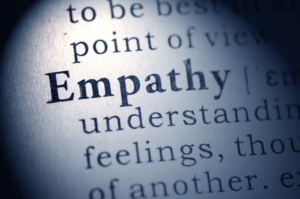 by Kaley Ihfe
by Kaley Ihfe
 When I was a small child, my parents took me to see the movie “For the Love of Benji.” The tagline for the movie is: “A wonderfully unique motion picture of laughter and love…” Unfortunately for my parents, I did not laugh at all because I was so upset about Benji being separated from his family. I sobbed so loudly that my parents had to take me out of the theater – my two-year-old self couldn’t handle the anxiety of the empathy that I was feeling.
When I was a small child, my parents took me to see the movie “For the Love of Benji.” The tagline for the movie is: “A wonderfully unique motion picture of laughter and love…” Unfortunately for my parents, I did not laugh at all because I was so upset about Benji being separated from his family. I sobbed so loudly that my parents had to take me out of the theater – my two-year-old self couldn’t handle the anxiety of the empathy that I was feeling.
Through the years, my empathy has led me in several directions – into working in middle schools, nonprofits, volunteering in various organizations, and as director of Lavish HOPE. There are a lot of needs in the world, and they show up in so many different ways. Everywhere we turn, there are needs to be met. So, how do we support those in need?
It starts with empathy. We have to understand the need – we don’t have to have had the same need, but we do have to be able to place ourselves in that person’s experience and understand what it is like to be in need – whether it is emotional, spiritual, or physical.
Don’t get drawn into the anxiety of the person who is in need. You will not be able to help them if you are anxious for them or about your own ability to help them. Your anxiety will only add to their anxiety and cause all of the anxiety to multiply. It is hard to relate to someone when your anxiety is creating its own narrative in your head – you start to impose on them what you are worried about instead of really listening to what they are worried about. It will be off putting to them and unhelpful in the long run.
Lastly, remember to reach out for help! Recognize your limitations. A few years ago I worked with a refugee family through the International Rescue Committee. In order to work with this family, we had to have a team of people signed up and trained to help. I can’t imagine how damaging it would have been if I had tried to do all the work myself! I needed the training provided by IRC, and the family needed the support of everyone on the team. Not one of us could have done it on our own.
One story that teaches me about God’s empathy is from Genesis 16 when Hagar is running away from Sarai after being mistreated by her. I imagine Hagar had often felt invisible before being abused. The angel of the Lord finds her as she runs away and calls her by name; then, he engages her in conversation showing his care for her. After her encounter with him, Hagar names God “El-Roi” meaning “The God who sees me.” God saw her pain, and it changed her life.
May we be people who can see others’ pain and be present with them in the midst of it.

Leave a Reply